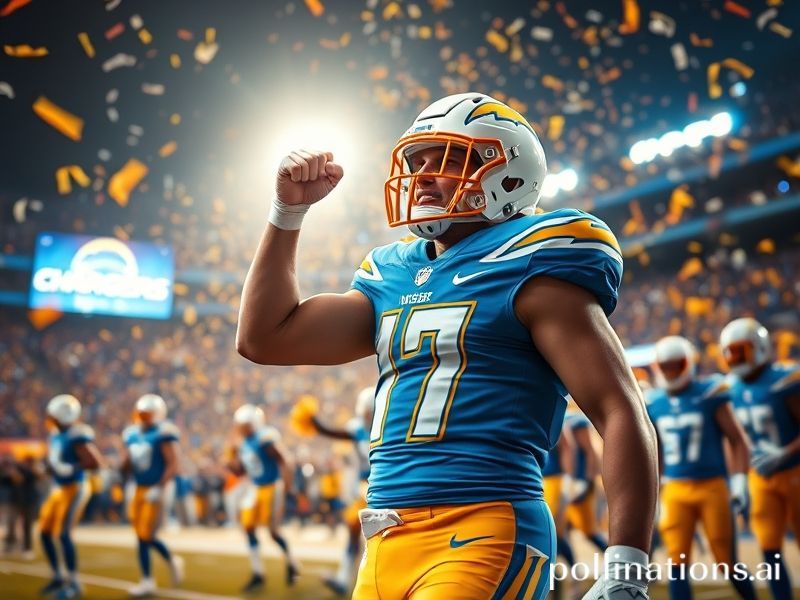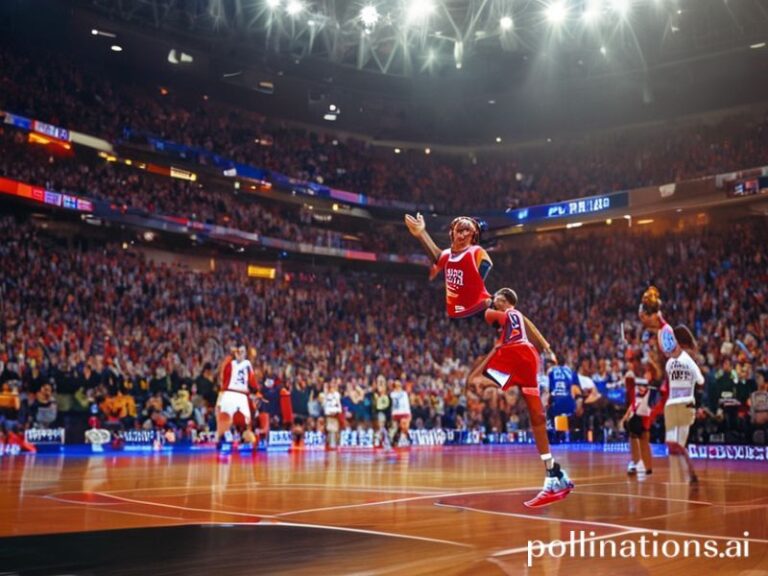The Los Angeles Chargers: Exporting Suburban Disappointment to a Galaxy Near You
Los Angeles, 2024 – On a planet where 828 million people went to bed hungry last night, 70,240 souls inside SoFi Stadium paid an average of 213 U.S. dollars to watch a football team that does not actually reside in Los Angeles lose to Baltimore in a sport that still insists on calling itself “football” despite using hands. Welcome, dear reader, to the global significance of the Los Angeles Chargers: a case study in how late-stage capitalism dresses up municipal heartbreak as spectacle and exports it worldwide via streaming packages.
To the uninitiated, the Chargers appear to be merely another American gridiron franchise, notable chiefly for their powder-blue jerseys—an accidental Pantone match for the UN peacekeepers’ helmets, which is either ironic or poetic depending on your blood-alcohol level. Yet to the international observer, the team is a perfect metaphor for the current world order: perpetually promising relocation to prosperity, chronically under-delivering, and somehow charging rent in the meantime.
Consider geography. The Chargers abandoned San Diego—population 1.4 million, median household income $89k—in 2017, citing an inability to extort a sufficiently luxurious stadium from taxpayers who preferred functioning fire departments. They migrated 120 miles north to a city that already had two basketball teams, two baseball teams, one hockey team, and a resident NFL franchise whose owner looks like a Bond villain played by Jon Voight. In other words, Los Angeles was the perfect host: a city whose primary export is curated delusion, rendered in 4K HDR.
From Seoul to São Paulo, the Chargers’ relocation plays on every screen as a cautionary telenovela about neoliberal mobility. Cities worldwide recognize the plot: a billionaire threatens to leave unless local governments mortgage the future, then leaves anyway, taking the communal identity with him like a carry-on bag. The only difference is scale. In Liverpool, fans sing about never walking alone; in Los Angeles, fans can’t even walk to the stadium without crossing three freeway lanes of Teslas. Meanwhile, the NFL’s international games—recently in Frankfurt and soon in Madrid—function as pop-up embassies for this model, training global municipalities in the fine art of building shrines to oligarchs who will, inevitably, demand newer shrines.
The roster itself reads like a UN Security Council roll call staffed by Marvel casting. Quarterback Justin Herbert, Oregon farm boy turned corporate avatar, has the arm strength to hit Taiwan from Catalina Island and the charisma of a DMV instructional video. Receivers arrive from Georgia (the country), defensive linemen from Nigeria via Canada, all united under the banner of a franchise whose greatest historical achievement remains losing four Super Bowls by increasingly creative margins. Their kicker is Polish, because of course the most reliable contributor is the guy whose job is to bail everyone else out with long-distance prayers.
One must admire the branding consistency. The Chargers’ thunderbolt logo—originally designed in 1960 when electricity was still futuristic—now doubles as the emoji for rolling blackouts, a neat synergy in a state that can’t keep the lights on. Their slogan, “Fight for LA,” sounds less like a sports motto and more like a municipal zoning dispute. Meanwhile, the league’s global marketing arm sells jerseys in Jakarta malls next to knockoff Supreme hoodies, ensuring that teenagers on three continents can cosplay as underperforming American debt instruments.
Yet perhaps the darkest joke is that the Chargers are, by NFL standards, competently managed. The same league currently features the Washington Commanders, whose previous owner allegedly ran a sex-trafficking ring and still got a $6.05 billion sale price—enough to buy every citizen of Laos a modest hatchback. By comparison, the Chargers’ sin is merely chronic mediocrity wrapped in extortionate rent-seeking, which, in 2024, practically qualifies them for a Nobel Peace Prize nomination.
In the end, the Los Angeles Chargers remind us that globalization is less about McDonald’s in Marrakesh and more about exporting the exquisite American talent for monetizing disappointment. From Kiev to Karachi, citizens know the feeling: promises of glory, followed by higher ticket prices and a shrug. The world watches, streams, bets, and sighs. Somewhere in the metaverse, a virtual Herbert throws a virtual touchdown to a virtual receiver, and the pixels cheer, because at least code doesn’t demand a bond measure.
The final whistle blows, the stands empty, and the Chargers fly home—technically to El Segundo, but let’s not split hairs. Humanity, meanwhile, staggers on, slightly poorer, slightly more entertained, and no closer to figuring out why we keep paying cover charge to watch billionaires play musical chairs with municipal loyalties. But hey, the nachos were decent, and the Wi-Fi worked just long enough to upload the despair to TikTok. Same time next Sunday, planet Earth?







